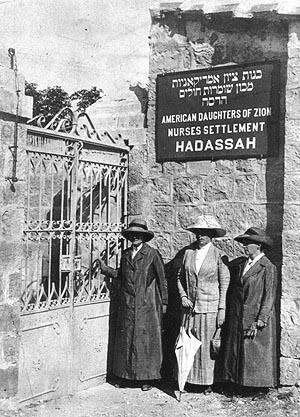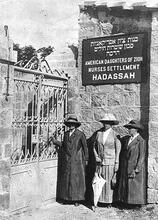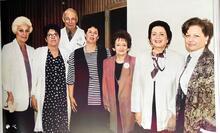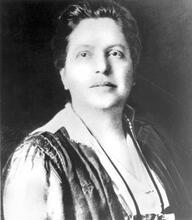Rae D. Landy
Rae Landy became assistant superintendent of Harlem Hospital in New York City in 1911, before being recruited by Henrietta Szold to travel with her to Palestine in 1913 to start a nursing service to combat dysentery, malaria, and typhoid among the settlers. With Rose Kaplan, another nurse volunteer, Landy created a clinic, overhauled health services for women and children, and began training young girls as nurses. After two years, Landy returned home, joining the US Army Nursing Corps in 1918 and serving overseas in Germany, Belgium, and France, then in the Philippines in the 1930s. She was named chief of nurses at Crile General Hospital in Cleveland, Ohio in 1944 and retired with the rank of lieutenant colonel, the second-highest rank in the Army Nursing Corps. Until her death, she continued to volunteer with the Red Cross and recruit nurses for Mount Sinai Hospital in Cleveland.
During a 1937 commemorative broadcast on NBC radio marking the twenty-fifth anniversary of Hadassah, the Women’s Zionist Organization of America, Army Nurse Corps Lieutenant Rae D. Landy spoke to First Lady Eleanor Roosevelt at the White House in a transoceanic hookup. Landy recalled her formative role in establishing Hadassah’s first district nursing service for the benefit of Jewish immigrants in Palestine in 1913. This pioneering venture had ignited Landy’s interest in public health nursing, administration, and national service, areas she would pursue throughout her career.
Early Life
Born in Lithuania on June 27, 1885, Rachael (later shortened to Rae) Landy was one of seven children in the family of Rabbi Jacob and Eva (Gross) Landy. The family immigrated to the United States and settled in Cleveland, Ohio, in 1888. Rae had three sisters—Lena, Mae, and Bessie—and three brothers—Reuben, Harry S., and Louis A. Landy’s parents helped to found the Hebrew Orthodox Old Age Home in Cleveland.
Nursing Career
Landy graduated in the first class of nursing students (1904) sponsored by the Jewish Women’s Hospital Association (later Mount Sinai Hospital) in Cleveland. In 1911, she became an assistant superintendent at Harlem Hospital in New York City. Recruited by Hadassah founder Henrietta Szold, Landy and Rose Kaplan traveled to Palestine in February 1913 to start a district visiting-nurse program among destitute immigrants, many of whom suffered from malaria, typhoid, and dysentery. The two Americans expanded the child and maternal health services begun by Eva Leon, utilizing the services of a university-trained physician and three experienced midwives. Landy initiated a program to combat trachoma, a common eye disease among children. From their home of two rented rooms at the edge of the Old City of Jerusalem, Landy and Kaplan launched a clinic and a nurses’ settlement house where young girls received training in nursing, first aid, and hygiene. Landy remained with the project for two and a half years before returning home when Hadassah activities were suspended during World War I.
Army Nursing Corps
In 1918, she entered the United States Army Nursing Corps. She served overseas with the American Expeditionary Forces in Germany, Belgium, and France, and in the Philippines during the 1930s. She was on duty at the White House when President Calvin Coolidge’s son, Calvin Jr., died there on July 7, 1924. Promoted to captain in 1940, Landy became assistant superintendent at the headquarters of the Second Corps Area at Governors Island in New York. Named chief of nurses at Crile General Hospital in Cleveland in 1944, she retired with the rank of lieutenant colonel, the second highest rank in the Army Nursing Corps. Until her death on March 5, 1952, she worked with the Cleveland Red Cross and recruited nurses for Mount Sinai Hospital. She was buried in Arlington National Cemetery in Washington, D.C.
Within the context of the local, national, and international Jewish community, Landy trained for a profession, developed leadership skills, and dedicated her services to the nursing field. While her role as a pioneering Hadassah nurse is notable in Jewish history, her military career also demonstrates how women in the first half of the twentieth century were able to pursue a career, assume positions of leadership, and create new opportunities for themselves.
AJYB 33 (1932): 180–184, and 54:540.
Arthur, Julietta K. “Child Welfare in the Holy Land.” American Journal of Nursing 40 (1940): 410–414.
Benson, Evelyn R. “Hadassah and the Nursing Connection: Early Days.” American Association for the History of Nursing Bulletin 26 (Spring 1990): 4–6.
Cleveland Press, March 7, 1952.
Kaplan, Rose. “Letters from Missionary Nurses, II.” Proceedings of the 17th Annual Conference of the ANA, St. Louis, Missouri, April 23–29, 1914. American Journal of Nursing 14 (1914): 870–872.
J.D. Deutsch Funeral Home. Records, MS 4339. Western Reserve Historical Society, Cleveland, Ohio>
Jewish Observer (Cleveland), July 28, 1916, 21, 23, 5:1, and September 15, 1916, 22, 5, 6:3.
Jewish Review and Observer (Cleveland), March 14, 1952, 78, 11, 6:5.
“News About Nursing: Nursing and the National Defense Program.” American Journal of Nursing 41 (1941): 223–224.
NYTimes, February 26, 1937, 16:4.
Obituary. NYTimes, March 7, 1952, 23:4.
Seligsberg, Alice L. “A Modern Training School for Nurses in Jerusalem.” American Journal of Nursing 21 (1921): 721–723.
Van Tassel, D., and J. Grabowski, eds. Encyclopedia of Cleveland History (1987).






